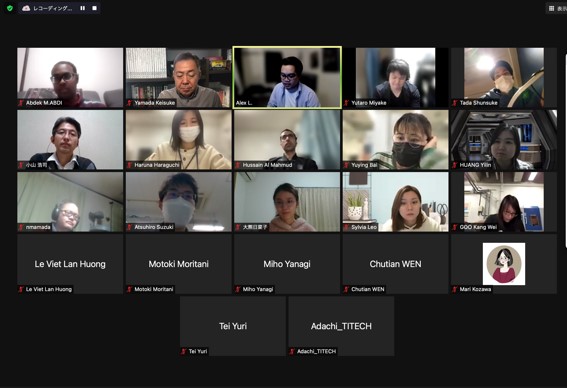Course Group: Leadership, followership and Consensus Building
Course Name: TAL.S503/TAL.S508 Professionals and Value Creation B/D
Program Name: Career Planning: Choosing the Right “First-Step” After University
Facilitators: Alex Lagata, Human Resources Director, rinna Co., Ltd.
Date & Time: 23/Dec/2021 18:15-20:15 on line
1. Background
Mr Alex Lagata is the human resources director of rinna Co, he was born and raised in the Philippines, and he graduated from Colegio de San Juan de Letran. He worked for Sony Japan between 2011 to 2014, he loved the fact that he improved the brand of Sony but he did not feel his direct impact to the people lives. Then, in 2014 he moved back to the Philippines and joined Alexander Mann Solutions, a recruitment process outsourcing company, he was a talent sourcer and university recruiter. In 2016, he came back to Japan and worked for Career Scout Japan as a headhunter. In 2017, he joined Microsoft Japan as a recruiter, and he met rinna team there which was a part of Microsoft at that time. When rinna spun off from Microsoft, he was proposed to become the HR Manager in 2020 and HR Director in November 2021. He spent three years in marketing and seven years in HR, he mentioned the importance of making the first best choice for your career, because he left a very stable job at Sony Japan for several non-stable jobs to reach his passion, objectives, and goals.

2. HR Trends
With the covid 19 pandemic, more and more workers are willing to work remotely, and technological skills of candidates is becoming more and more important for a recruiter especially the ability of a candidate to use online communication software like Microsoft Teams. The recruiters are also looking for professional and mature candidates that can handle pressure. Also, candidates must be aware about the information they share online because your online activities can become data or information about you. During interviews, candidate must showcase their technological skills, their ability to work online and their communication skills to their employers.
3. Startup vs big companies
※ Pros
For startups the career path is fast, the responsibilities are various and there is a freedom of opinion. For big company the responsibilities are already fixed, there are specialized workers, it is not easy to move sideways and need to follow the process. But big companies can provide a lot of benefits and a stable situation.
※Cons
For startups, the company is unstable, there is a chance of overwork and there is a need to set up a process (like reimbursement process or recruitment process). For big companies, the career path is slow, there is a routine work, and the opinions are hierarchical. The big companies tend to pay more than startups, but their career path is slower than startups.
4. Case story about rinna
Alex Lagata shared a story of a former intern, who chose to work for another company to follow his passion. He had to go to Sendai and had to leave his life in Tokyo with his girlfriend. Although he followed his passion, he realized that his life was in Tokyo so he decided to join rinna on January of 2021. Candidates usually focus on career, on salary, or prestige but do not think about the life they want to live while working which affects your workstyle, motivation, and decisions.
5. Advice
Know who you really are first and especially what life would you like to live before looking for where you want to work. Your life should be supported by work, and not the other way around.
6. Questions and answers
– Question: I was quite interested in HR position, what are the requirements?
Answer: Everybody can become HR, you only need professional communication skills because if you are passionate talking to people and changing their lives, that is the start to become a very good HR employee.
– Question: You said that communication skills are important but what are communication skills?
Answer: Firstly, it is professionalism in your work, then being precise during communication, and finally being able to meet eye-to-eye while communicating with your colleagues/customers.
– Question: What are the things that streak off any candidate from your list of people to hire?
Answer: My first advice will be, know your HR person because the HR team is a great indicator of the culture of a company. You also need to read and really understand the Job Description. If possible, use keywords from the job description and connect it to relevant skills that you have. Talking about your passion is always great but know your audience first. If your interview (let’s say HR) is very energetic, you can match that energy and the communication flow will be smoother. Networking with HR people and companies can be useful in the future. When HR employees ask you if you have any questions during the interview, do not say “none” but ask questions about the job description. And finally (and most importantly), be yourself during interviews. When finding a job, do not pretend to be something you are not, it would be tiring to continue doing that if you get that job that way. Instead, be yourself, apply to as many companies that interests you, and then sign the offer of the company that resonates with you the most.
– Question: Can I go to startups first to gain experience and then go to a bigger company?
Answer: This is the way to go, it is better to retire in a bigger company, because the benefits are better. But if you are for career growth, learning a broader skillset or just moving to a completely different department, Startups are a good choice.
– Question: Does your first career really affect your career path? How do you know who you really are?
Answer: Financially yes, because usually your next employer does not go lower than your previous position. If an employer offers you a better job, HR usually ask your previous salary, and give a 10 – 30% higher salary.
To learn who you are in a way to decide which work is a fit, you must know who you are outside of the job (what type of lifestyle do you want to live, what type of people do you want to work with and meet), who you are will never change but your skills can.
– Question: When do you start recruiting interns and what is the duration of your internship?
Answer: I start my university recruiting tour in January, but we will open our hiring for summer and midterm internship by March. Summer Internship is for 2 months (whole of August and September) and the anytime internship is for three months, it can be renewed according to your availability at school, and it will be remote internship.
– Question: Do you have any requirements for internship?
Answer: No, not really, as long as you are interested in the role, and you have a very good cv you are eligible. Just make sure to showcase your communications skills (this can also be seen by the way you write your resume).

(Reported by Abdek Mahamoud Abdi, Dept. of Transdisciplinary Science and Engineering, School of Environment and Society, D1)


